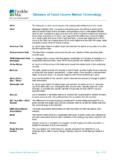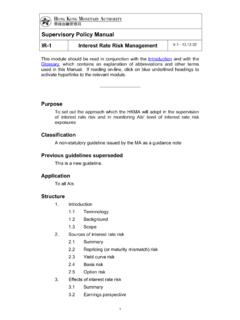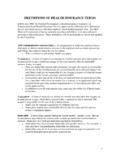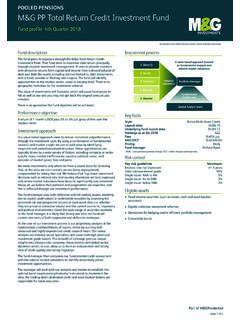Transcription of Real Estate Terminology - myexamkey.com
1 United real Estate Media - real Estate Terminology glossary & DEFINITIONS A to Z acceleration clause A clause in your mortgage which allows the lender to demand payment of the outstanding loan balance for various reasons. The most common reasons for accelerating a loan are if the borrower defaults on the loan or transfers title to another individual without informing the lender. adjustable-rate mortgage (ARM) A mortgage in which the interest changes periodically, according to corresponding fluctuations in an index. All ARMs are tied to indexes.
2 Adjustment date The date the interest rate changes on an adjustable-rate mortgage amortization The loan payment consists of a portion which will be applied to pay the accruing interest on a loan, with the remainder being applied to the principal. Over time, the interest portion decreases as the loan balance decreases, and the amount applied to principal increases so that the loan is paid off (amortized) in the specified time. amortization schedule A table which shows how much of each payment will be applied toward principal and how much toward interest over the life of the loan.
3 It also shows the gradual decrease of the loan balance until it reaches zero. annual percentage rate (APR) This is not the note rate on your loan. It is a value created according to a government formula intended to reflect the true annual cost of borrowing, expressed as a percentage. It works sort of like this, but not exactly, so only use this as a guideline: deduct the closing costs from your loan amount, then using your actual loan payment, calculate what the interest rate would be on this amount instead of your actual loan amount.
4 You will come up with a number close to the APR. Because you are using the same payment on a smaller amount, the APR is always higher than the actual not rate on your loan. application The form used to apply for a mortgage loan, containing information about a borrower s income, savings, assets, debts, and more. appraisal A written justification of the price paid for a property, primarily based on an analysis of comparable sales of similar homes nearby. appraised value An opinion of a property's fair market value, based on an appraiser's knowledge, experience, and analysis of the property.
5 Since an appraisal is based primarily on comparable sales, and the most recent sale is the one on the property in question, the appraisal usually comes out at the purchase price. appraiser An individual qualified by education, training, and experience to estimate the value of real property and personal property. Although some appraisers work directly for mortgage lenders, most are independent. appreciation The increase in the value of a property due to changes in market conditions, inflation, or other causes. assessed value The valuation placed on property by a public tax assessor for purposes of taxation.
6 Assessment The placing of a value on property for the purpose of taxation. assessor A public official who establishes the value of a property for taxation purposes. asset Items of value owned by an individual. Assets that can be quickly converted into cash are considered "liquid assets." These include bank accounts, stocks, bonds, mutual funds, and so on. Other assets include real Estate , personal property, and debts owed to an individual by others. assignment When ownership of your mortgage is transferred from one company or individual to another, it is called an assignment.
7 Assumable mortgage A mortgage that can be assumed by the buyer when a home is sold. Usually, the borrower must "qualify" in order to assume the loan. assumption The term applied when a buyer assumes the seller s mortgage. balloon mortgage A mortgage loan that requires the remaining principal balance be paid at a specific point in time. For example, a loan may be amortized as if it would be paid over a thirty year period, but requires that at the end of the tenth year the entire remaining balance must be paid. balloon payment The final lump sum payment that is due at the termination of a balloon mortgage.
8 Bankruptcy By filing in federal bankruptcy court, an individual or individuals can restructure or relieve themselves of debts and liabilities. Bankruptcies are of various types, but the most common for an individual seem to be a "Chapter 7 No Asset" bankruptcy which relieves the borrower of most types of debts. A borrower cannot usually qualify for an "A" paper loan for a period of two years after the bankruptcy has been discharged and requires the re-establishment of an ability to repay debt. bill of sale A written document that transfers title to personal property.
9 For example, when selling an automobile to acquire funds which will be used as a source of down payment or for closing costs, the lender will usually require the bill of sale (in addition to other items) to help document this source of funds. biweekly mortgage A mortgage in which you make payments every two weeks instead of once a month. The basic result is that instead of making twelve monthly payments during the year, you make thirteen. The extra payment reduces the principal, substantially reducing the time it takes to pay off a thirty year mortgage.
10 Note: there are independent companies that encourage you to set up bi-weekly payment schedules with them on your thirty year mortgage. They charge a set-up fee and a transfer fee for every payment. Your funds are deposited into a trust account from which your monthly payment is then made, and the excess funds then remain in the trust account until enough has accrued to make the additional payment which will then be paid to reduce your principle. You could save money by doing the same thing yourself, plus you have to have faith that once you transfer money to them that they will actually transfer your funds to your lender.





